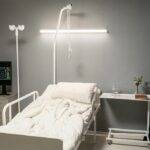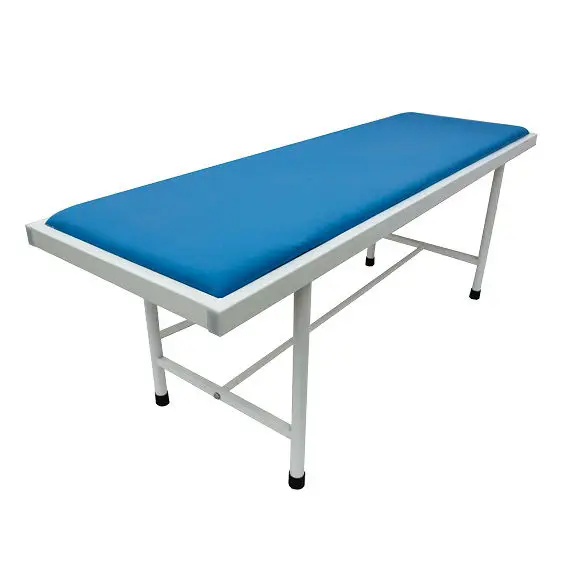Dirección
304 North Cardinal St.
Dorchester Center, MA 02124
Horas laborales
Lunes a viernes: 7:00 a. M. - 7:00 p. M.
Fin de semana: 10 a. M. - 5 p. M.
Dirección
304 North Cardinal St.
Dorchester Center, MA 02124
Horas laborales
Lunes a viernes: 7:00 a. M. - 7:00 p. M.
Fin de semana: 10 a. M. - 5 p. M.

In the medical field, the accuracy of patient diagnosis is paramount. One often-overlooked element that plays a significant role in achieving diagnostic precision is the patient examination couch. These couches, also known as examination tables, are designed to support and position patients during medical evaluations, tests, and treatments. By providing stability, comfort, and accessibility, patient examination couches contribute to more accurate and effective diagnostics. This blog explores how patient examination couches enhance diagnostic accuracy, focusing on their design, functionality, and impact on clinical outcomes.

In the medical field, the accuracy of patient diagnosis is paramount. One often-overlooked element that plays a significant role in achieving diagnostic precision is the patient examination couch. These couches, also known as examination tables, are designed to support and position patients during medical evaluations, tests, and treatments. By providing stability, comfort, and accessibility, patient examination couches contribute to more accurate and effective diagnostics. This blog explores how patient examination couches enhance diagnostic accuracy, focusing on their design, functionality, and impact on clinical outcomes.
Patient examination couches are specialized tables used in medical settings to support patients during various types of examinations and procedures. They come in a range of designs and configurations, tailored to meet the needs of different medical disciplines and procedures.
Patient comfort is essential for accurate diagnostics. Examination couches are designed to provide a comfortable surface for patients, which helps them remain still and relaxed during the examination. Features such as padded cushions and adjustable backrests contribute to patient comfort.
The ability to adjust the height, tilt, and position of the examination couch allows for optimal positioning of patients. This adjustability is crucial for various diagnostic procedures, ensuring that the patient is positioned correctly for accurate results.
A stable examination couch minimizes patient movement during procedures, which is critical for obtaining precise diagnostic information. Couches are built to provide a sturdy and stable platform, reducing the risk of errors caused by patient shifts.
Patient examination couches are designed to facilitate easy access for both patients and medical professionals. Features such as adjustable heights and easy-to-reach controls enhance accessibility and ease of use during examinations.
Accurate diagnostic results depend on the proper positioning of patients. Examination couches with adjustable features allow healthcare providers to position patients precisely according to the requirements of the diagnostic procedure. For example, a gynecological examination couch can be adjusted to the correct angle for a pelvic exam, improving the accuracy of the results.
Patient movement during diagnostic procedures can lead to inaccurate results. A stable examination couch minimizes patient movement, ensuring that images and measurements are not distorted by shifts. This is particularly important in procedures such as ultrasound, X-rays, and physical examinations where precision is crucial.
Examination couches that are adjustable and easy to maneuver provide medical professionals with better access to patients. This accessibility allows for more thorough and accurate examinations, as healthcare providers can reach all necessary areas without straining or compromising their technique.
A comfortable patient is more likely to remain still and relaxed during an examination. Examination couches with padded surfaces and ergonomic designs contribute to patient comfort, which in turn improves the quality of diagnostic results. Reduced patient discomfort helps in obtaining more accurate readings and observations.
Specialized examination couches are designed to support specific diagnostic procedures. For instance, a dermatological examination couch may include features such as built-in lighting and magnification to aid in skin assessments. These specialized features enhance the accuracy of diagnostic procedures in various medical fields.
The following table compares different types of patient examination couches based on key features:
| Característica | Adjustable Couches | Electric Couches | Manual Couches | Specialty Couches |
|---|---|---|---|---|
| Ajuste de altura | Sí | Sí | Sí | Sí |
| Ajuste de inclinación | Sí | Sí | Limitado | Sí |
| Controles eléctricos | No | Sí | No | Varía |
| Comfort Features | Alto | Alto | Moderado | Alto |
| Estabilidad | Alto | Alto | Moderado | Alto |
| Specialty Features | Básico | Básico | Básico | Avanzado |

| Estudio de caso | Medical Field | Couch Type | Improvement in Accuracy |
|---|---|---|---|
| Gynecological Exam | Gynecology | Adjustable Couch | Improved positioning for accurate pelvic exams |
| Ultrasound Imaging | Radiology | Sofá eléctrico | Reduced patient movement leading to clearer imaging results |
| Orthopedic Assessment | Orthopedics | Specialty Couch | Enhanced access for detailed musculoskeletal evaluations |
| Dermatological Exam | Dermatology | Specialty Couch | Integrated lighting and magnification for precise skin assessments |
Patient examination couches are a critical component in improving diagnostic accuracy across various medical fields. Their design features, including adjustability, comfort, stability, and accessibility, play a significant role in supporting accurate and effective diagnostics. By understanding the advantages and selecting the appropriate type of examination couch, healthcare providers can enhance patient care and achieve better clinical outcomes. Investing in high-quality patient examination couches ensures that medical professionals can perform examinations with precision and confidence, ultimately benefiting patient health and diagnosis accuracy.
Q:What types of patient examination couches ¿están disponibles?
A:Patient examination couches come in various types, including adjustable, electric, manual, and specialty couches. Each type offers different features and benefits depending on the specific medical needs and procedures.
Q:How do patient examination couches improve diagnostic accuracy?
A:Examination couches improve diagnostic accuracy by providing stable and adjustable platforms that enhance patient positioning, reduce movement, and offer better access for medical professionals. Comfortable and well-designed couches help ensure that patients remain still and relaxed during examinations.
Q:What features should I look for in a patient examination couch?
A:Key features to consider include height and tilt adjustability, comfort and padding, stability, and any specialized features needed for specific medical procedures. Electric controls can also provide convenience and precision in positioning.
Q:Can patient examination couches be used for specialized procedures?
A:Yes, many patient examination couches are designed for specialized medical fields, such as gynecology, orthopedics, and dermatology. These specialty couches come with features tailored to enhance the accuracy and effectiveness of specific diagnostic procedures.
Q:How does patient comfort affect diagnostic accuracy?
A:Patient comfort is crucial for ensuring that patients remain still and relaxed during examinations. A comfortable examination couch helps reduce patient movement, leading to more accurate diagnostic results.
Q:Are electric examination couches better than manual ones?
A:Electric examination couches offer convenience with motorized adjustments and precise positioning, making them ideal for procedures requiring accurate adjustments. Manual couches are cost-effective but may require more effort for adjustments. The choice depends on specific needs and budget considerations.